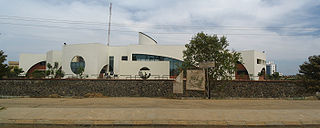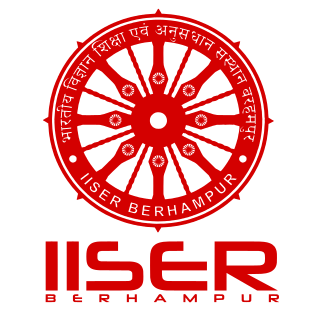Related Research Articles

Tata Institute of Fundamental Research (TIFR) is a leading research Institute under the Department of Atomic Energy of the Government of India. It is a public deemed university located at Navy Nagar, Colaba in Mumbai. It also has a centres in Bangalore, Pune and Hyderabad. TIFR conducts research primarily in the natural sciences, the biological sciences and theoretical computer science.

Chennai Mathematical Institute (CMI) is a higher education and research institute in Chennai, India. It was founded in 1989 by the SPIC Science Foundation, and offers undergraduate and postgraduate programmes in physics, mathematics and computer science. CMI is noted for its research in algebraic geometry, in particular in the area of moduli of bundles.
The Joint Entrance Examination (JEE) is an engineering entrance assessment conducted for admission to various engineering colleges in India. It comprises two different examinations: the JEE-Main and the JEE-Advanced.

The TIFR Centre for Applicable Mathematics is part of the School of Mathematics of the Tata Institute of Fundamental Research.

Indian Institutes of Science Education and Research (IISERs) are a group of autonomous institutions established by the Government of India through the Ministry of Education for teaching and research in natural science and to provide collegiate education in basic sciences integrated with research at the undergraduate level.

Thanu Padmanabhan was an Indian theoretical physicist and cosmologist whose research spanned a wide variety of topics in gravitation, structure formation in the universe and quantum gravity. He published nearly 300 papers and reviews in international journals and ten books in these areas. He made several contributions related to the analysis and modelling of dark energy in the universe and the interpretation of gravity as an emergent phenomenon. He was a Distinguished Professor at the Inter-University Centre for Astronomy and Astrophysics (IUCAA) at Pune, India.

The National Institute of Science Education and Research (NISER) is an autonomous research institute in Jatani, Odisha, India, aided by Department of Atomic Energy. The institute is affiliated by Homi Bhabha National Institute. Former Prime Minister Manmohan Singh laid the foundation stone on August 28, 2006. Government of India earmarked an initial outlay of ₹823.19 crore (US$96 million) during the first seven years of the project, starting in September 2007. It was ranked second in the country by the Nature Index 2020.

Narayansami Sathyamurthy is a chemist in India. He is the founding director of the Indian Institute of Science Education and Research (IISER), Mohali, Punjab, India and the President of Chemical Research Society of India.

Indian Institute of Science Education and Research, Mohali is an autonomous public research university established in 2007 at Mohali, Punjab, India. It is one of the seven Indian Institutes of Science Education and Research (IISERs), established by the Ministry of Human Resources and Development, Government of India, to research in frontier areas of science and to provide science education at the undergraduate and postgraduate level. It was established after IISER Pune and IISER Kolkata and is recognized as an Institute of National Importance by the Government of India. Institute focuses on pure research as well as interdisciplinary research in various fields of science.

Indian Institute of Science Education and Research, Pune is an autonomous public university established in 2006. It is one of the seven Indian Institutes of Science Education and Research, and was one of the first IISERs to be established along with IISER Kolkata. It is located in the city of Pune, India.

Arun Kumar Pati is an Indian physicist notable for his research in quantum information, quantum computation and Foundations of quantum mechanics. He has made pioneering contributions in the area of quantum information. He is considered as the Father of Indian Quantum Computing.

Indian Institute of Science Education and Research, Vithura, Thiruvananthapuram is an autonomous public university located in Vithura, Kerala, India. The institute is one of the seven IISERs established by the Ministry of Human Resource Development, Government of India, to bridge the gap between research and basic sciences' education at the undergraduate level. All IISERs are declared as Institutes of National Importance by the Parliament of India in 2012 through the NIT Amendment Act.

Indian Institute of Science Education and Research, Bhopal is a prestigious autonomous research institute in Bhauri, Bhopal district, Madhya Pradesh, India. It was established by the Ministry of Education (India), Government of India in 2008 in order to incorporate research in fundamental science at undergraduate and graduate level, with equal emphasis on higher education for research and education in science. It is an autonomous institution awarding its own degrees.
Dibyendu Nandi is an Indian space scientist known for his research related to the solar cycle, solar dynamo activity and their influence on space weather. Nandi is the head of the Center of Excellence in Space Sciences, India or CESSI at IISER Kolkata. He is associated with Montana State University, the Center for Astrophysics | Harvard & Smithsonian and IISER Kolkata where he carried out most of his research work.
Somdatta Sinha is an Indian researcher and professor of biology, who is one of the earliest to start working in the area of theoretical biology in India. Her expertise is in the interdisciplinary fields of mathematical & computational biology, nonlinear dynamics and complex systems with a view to understand the logic and design of biological processes. She studies spatio-temporal organization in biological systems – from biological sequences to spread of disease in populations – using mathematical and computational methods. She has played a central role in the development of mathematical and computational biology in her country through research, organization of scientific meetings, training programs, conferences, and teaching interdisciplinary courses at the undergraduate and postgraduate levels. Her research encompasses patterns, interactions, and dynamics of biological systems using mathematical and physical methods to understand complex multi-scale biological systems. Sinha's research contributions focus on modelling a variety of biological systems, such as, circadian rhythms, pattern formation, biochemical pathways, synthetic biology, single and meta-population ecological models, epidemiology, and controlling spatiotemporal dynamics. She has also carried out computational analysis of genomes for classification of organisms using Chaos Game Representation (CGR) and Multi-fractal analysis, protein structure function analysis using graph theory, and network analysis of large biochemical pathways. Her publications have made important contributions in the respective fields and are highly cited. Her seminal contribution to the development of the interdisciplinary field of Mathematical and Computational Biology in India was acknowledged by the Department of Biotechnology, Govt of India with the National Senior Woman Bioscientist Award in 2013 and the J C Bose National Fellowship from the Department of Science and Technology, Govt. of India. She is a fellow of the Indian National Science Academy, Indian Academy of Sciences and National Academy of Sciences. She was elected Fellow of the Wissenschaftskolleg zu Berlin for 2000-2001 and International Visiting Research Scholar at the Peter Wall Institute for Advanced Studies at the University of British Columbia, Vancouver, Canada in 2018. She has traveled widely across the globe and has given many invitational talks in universities and conferences.

Indian Institute of Technology Tirupati is an autonomous engineering and technology education institute located in Tirupati, Andhra Pradesh. Initially mentored by IIT Madras, Tirupati is a 3rd generation IIT is located in Yerpedu. The institute has a size of 539 acres, including a proposed research park. The Foundation stone for IIT Tirupati was laid by the Union Minister Smriti Irani and the then Union Minister and former Vice President of India M.Venkaiah Naidu and the then chief minister of Andhra Pradesh N. Chandrababu Naidu.

Indian Institute of Science Education and Research, Berhampur is an autonomous public research and science education institute in Berhampur, Odisha, India. The institute is one of the 7 IISERs established by the Ministry of Human Resource Development. IISER Berhampur is recognized as an Institute of National Importance by the Government of India. The institute started functioning from 2016–17 academic year in the month of August.
Virendra Singh is an Indian theoretical physicist and a former C. V. Raman chair professor and director of the Tata Institute of Fundamental Research (TIFR). Known for his research in high energy physics, Singh is an elected fellow of all the three major Indian science academies - Indian National Science Academy, Indian Academy of Sciences and National Academy of Sciences, India as well as The World Academy of Sciences. The Council of Scientific and Industrial Research, the apex agency of the Government of India for scientific research, awarded him the Shanti Swarup Bhatnagar Prize for Science and Technology, one of the highest Indian science awards, for his contributions to Physical Sciences in 1973.
Probir Roy is an Indian particle physicist and a former professor at Tata Institute of Fundamental Research. He is also a senior scientist of the Indian National Science Academy at Bose Institute and a former Raja Ramanna fellow of Department of Atomic Energy at Saha Institute of Nuclear Physics.

Krishnarajanagar Nagappa Ganesh is an Indian bio-organic chemist and served as the (founding) director of Indian Institute of Science Education and Research, Tirupati since 2017 till 2023. He is also the founding director of Indian Institute of Science Education and Research, Pune, that was established in 2006 and served the office till 2017. He is a recipient of the Shanti Swarup Bhatnagar Prize in chemical sciences (1998) for "his outstanding contribution towards the understanding of the chemical principles of DNA molecular recognition and for his work on various facets of DNA structure and its interaction with drugs and proteins". He is also a Fellow of the Indian National Science Academy since 2000.
References
- 1 2 3 4 JEST (23 November 2023). "Joint Entrance Screening Test - 2024" (PDF). Joint Entrance Screening Test. Retrieved 25 November 2023.
- ↑ "Office Memorandum No.SB/S9/Z-01/2015" (PDF). Science and Engineering Research Board . 7 January 2015. p. 2. Retrieved 26 April 2017.
- ↑ S., Praveenkumar (7 January 2015). "No.SB/S9/Z-01/2015 - Office Memorandum" (PDF). Visva-Bharati University . Retrieved 24 November 2023.
- 1 2 Warrier, B. S. (30 March 2011). "JEST: a passport to science research". The Hindu . Retrieved 26 April 2017.
- ↑ India Today Web Desk (24 February 2017). "JEST 2017 exam date extended: Check out the new schedule". India Today . Retrieved 26 April 2017.
- 1 2 Warrier, B. S. (11 November 2019). "Eyeing science research in top institutes? Apply for JEST now". OnManorama . Retrieved 25 November 2023.
- ↑ Correspondent (3 March 2023). "JEST 2023 Application window closing today; Apply Now at jest.org.in". Telegraph India . Retrieved 25 November 2023.
{{cite news}}:|author=has generic name (help) - 1 2 Warrier, B. S. (18 December 2021). "JEST 2022: Apply online by January 18". OnManorama . Retrieved 25 November 2023.